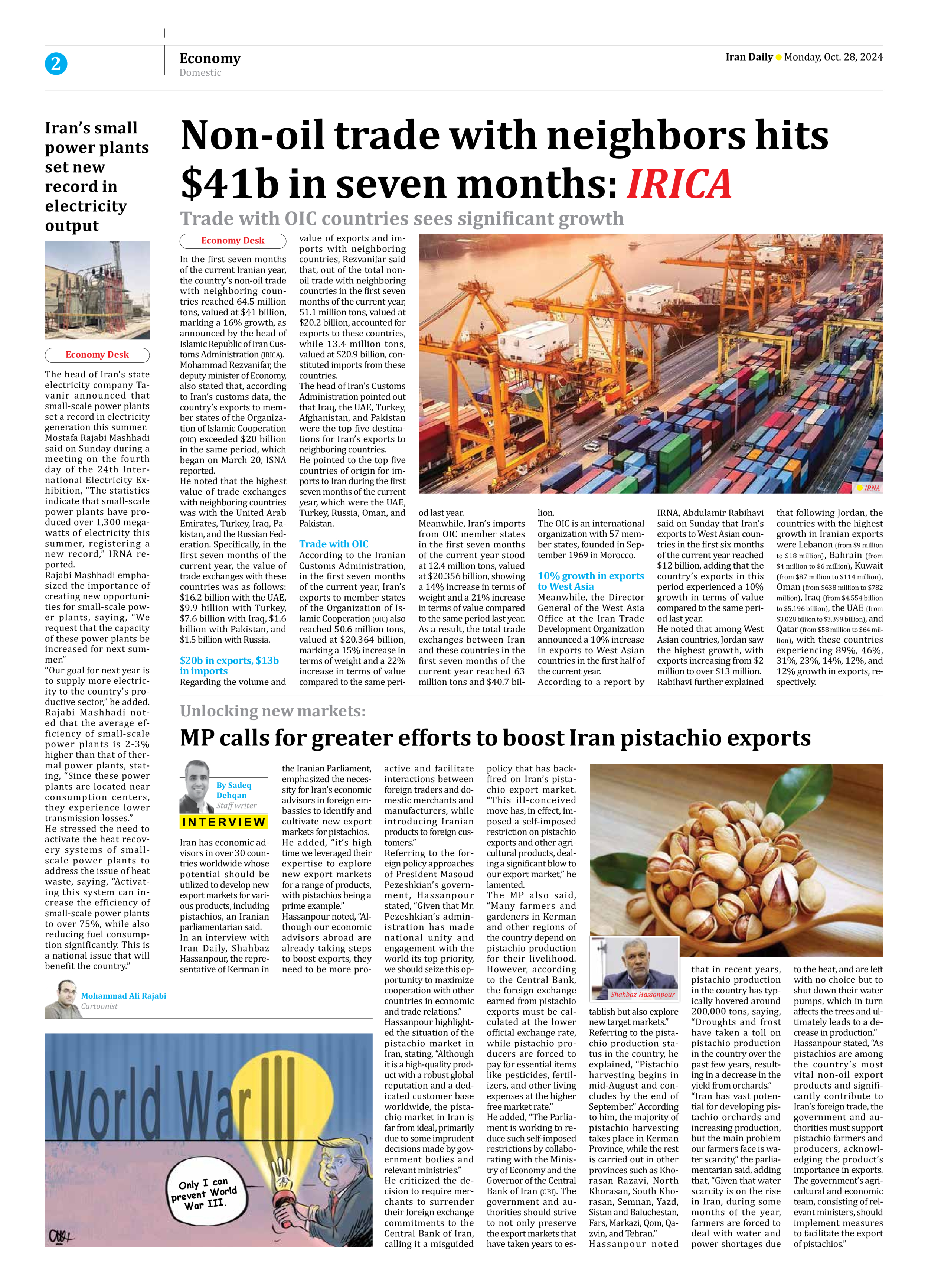
Unlocking new markets:
MP calls for greater efforts to boost Iran pistachio exports
By Sadeq Dehqan
Staff writer
Iran has economic advisors in over 30 countries worldwide whose potential should be utilized to develop new export markets for various products, including pistachios, an Iranian parliamentarian said.
In an interview with Iran Daily, Shahbaz Hassanpour, the representative of Kerman in the Iranian Parliament, emphasized the necessity for Iran’s economic advisors in foreign embassies to identify and cultivate new export markets for pistachios.
He added, “it’s high time we leveraged their expertise to explore new export markets for a range of products, with pistachios being a prime example.”
Hassanpour noted, “Although our economic advisors abroad are already taking steps to boost exports, they need to be more proactive and facilitate interactions between foreign traders and domestic merchants and manufacturers, while introducing Iranian products to foreign customers.”
Referring to the foreign policy approaches of President Masoud Pezeshkian’s government, Hassanpour stated, “Given that Mr. Pezeshkian’s administration has made national unity and engagement with the world its top priority, we should seize this opportunity to maximize cooperation with other countries in economic and trade relations.”
Hassanpour highlighted the situation of the pistachio market in Iran, stating, “Although it is a high-quality product with a robust global reputation and a dedicated customer base worldwide, the pistachio market in Iran is far from ideal, primarily due to some imprudent decisions made by government bodies and relevant ministries.”
He criticized the decision to require merchants to surrender their foreign exchange commitments to the Central Bank of Iran, calling it a misguided policy that has backfired on Iran’s pistachio export market. “This ill-conceived move has, in effect, imposed a self-imposed restriction on pistachio exports and other agricultural products, dealing a significant blow to our export market,” he lamented.
The MP also said, “Many farmers and gardeners in Kerman and other regions of the country depend on pistachio production for their livelihood. However, according to the Central Bank, the foreign exchange earned from pistachio exports must be calculated at the lower official exchange rate, while pistachio producers are forced to pay for essential items like pesticides, fertilizers, and other living expenses at the higher free market rate.”
He added, “The Parliament is working to reduce such self-imposed restrictions by collaborating with the Ministry of Economy and the Governor of the Central Bank of Iran (CBI). The government and authorities should strive to not only preserve the export markets that have taken years to establish but also explore new target markets.”
Referring to the pistachio production status in the country, he explained, “Pistachio harvesting begins in mid-August and concludes by the end of September.” According to him, the majority of pistachio harvesting takes place in Kerman Province, while the rest is carried out in other provinces such as Khorasan Razavi, North Khorasan, South Khorasan, Semnan, Yazd, Sistan and Baluchestan, Fars, Markazi, Qom, Qazvin, and Tehran.”
Hassanpour noted that in recent years, pistachio production in the country has typically hovered around 200,000 tons, saying, “Droughts and frost have taken a toll on pistachio production in the country over the past few years, resulting in a decrease in the yield from orchards.”
“Iran has vast potential for developing pistachio orchards and increasing production, but the main problem our farmers face is water scarcity,” the parliamentarian said, adding that, “Given that water scarcity is on the rise in Iran, during some months of the year, farmers are forced to deal with water and power shortages due to the heat, and are left with no choice but to shut down their water pumps, which in turn affects the trees and ultimately leads to a decrease in production.”
Hassanpour stated, “As pistachios are among the country’s most vital non-oil export products and significantly contribute to Iran’s foreign trade, the government and authorities must support pistachio farmers and producers, acknowledging the product’s importance in exports. The government’s agricultural and economic team, consisting of relevant ministers, should implement measures to facilitate the export of pistachios.”







